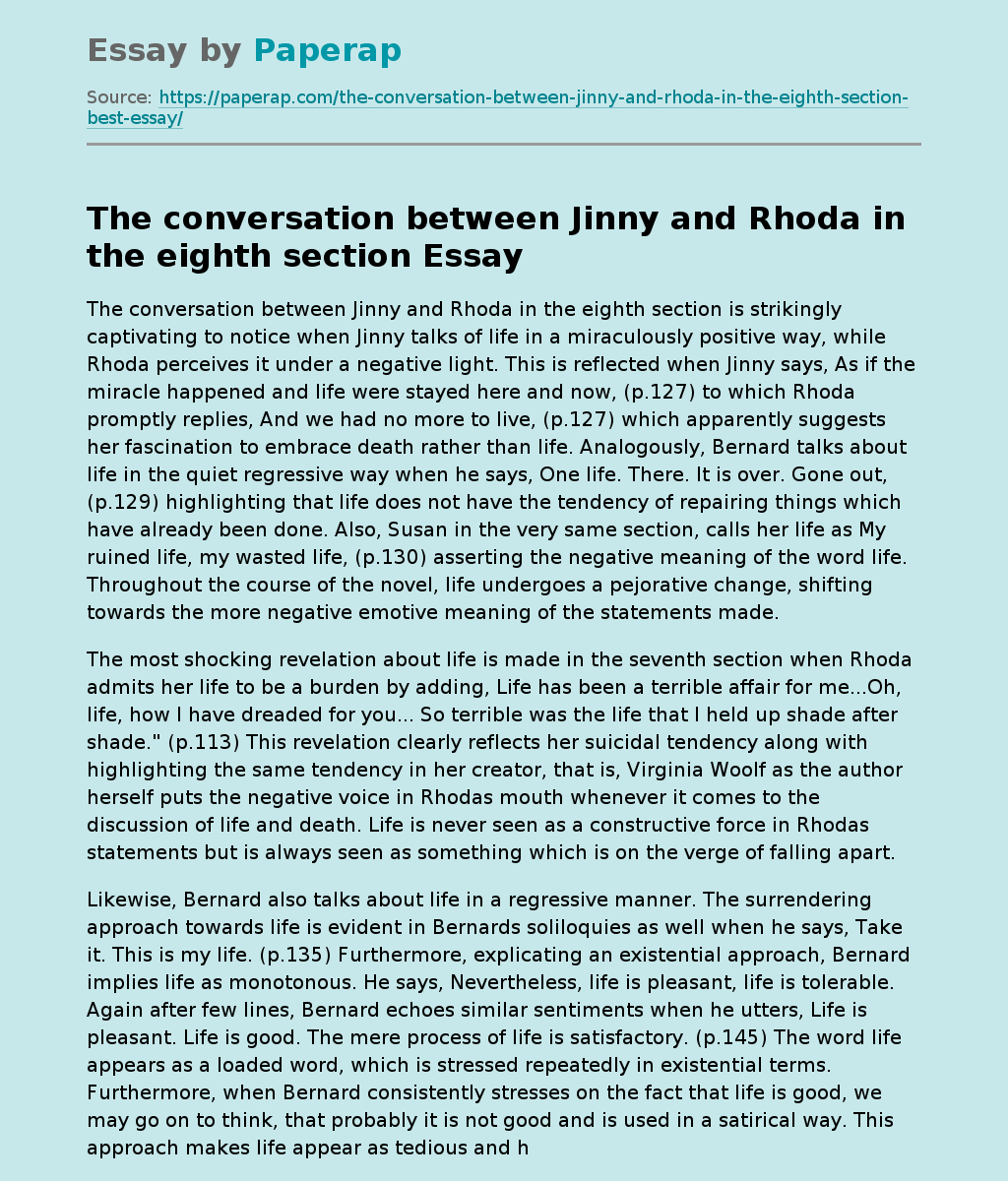The conversation between Jinny and Rhoda in the eighth section
The following sample essay on “The conversation between Jinny and Rhoda in the eighth section”: discuss existentialism theme in conversation between Jinny and Rhoda.
The conversation between Jinny and Rhoda in the eighth section is strikingly captivating to notice when Jinny talks of life in a miraculously positive way, while Rhoda perceives it under a negative light. This is reflected when Jinny says, As if the miracle happened and life were stayed here and now, (p.127) to which Rhoda promptly replies, And we had no more to live, (p.
127) which apparently suggests her fascination to embrace death rather than life. Analogously, Bernard talks about life in the quiet regressive way when he says, One life. There. It is over. Gone out, (p.129) highlighting that life does not have the tendency of repairing things which have already been done. Also, Susan in the very same section, calls her life as My ruined life, my wasted life, (p.130) asserting the negative meaning of the word life.
Throughout the course of the novel, life undergoes a pejorative change, shifting towards the more negative emotive meaning of the statements made.
The most shocking revelation about life is made in the seventh section when Rhoda admits her life to be a burden by adding, Life has been a terrible affair for me…Oh, life, how I have dreaded for you… So terrible was the life that I held up shade after shade.” (p.113) This revelation clearly reflects her suicidal tendency along with highlighting the same tendency in her creator, that is, Virginia Woolf as the author herself puts the negative voice in Rhodas mouth whenever it comes to the discussion of life and death.
Life is never seen as a constructive force in Rhodas statements but is always seen as something which is on the verge of falling apart.
Likewise, Bernard also talks about life in a regressive manner. The surrendering approach towards life is evident in Bernards soliloquies as well when he says, Take it. This is my life. (p.135) Furthermore, explicating an existential approach, Bernard implies life as monotonous. He says, Nevertheless, life is pleasant, life is tolerable. Again after few lines, Bernard echoes similar sentiments when he utters, Life is pleasant. Life is good. The mere process of life is satisfactory. (p.145) The word life appears as a loaded word, which is stressed repeatedly in existential terms. Furthermore, when Bernard consistently stresses on the fact that life is good, we may go on to think, that probably it is not good and is used in a satirical way. This approach makes life appear as tedious and hard to live. This is affirmed when the very same expression is repeated for the third time and that too from Bernards mouth, Life is pleasant, life is good. After Monday comes Tuesday and Wednesday follows. (p.145)
The semantic shifts throughout the novel (see Table 4) highlight the dynamic nature of meaning, where the word life, when considered individually, is ameliorative but when seen in association in soliloquies of different characters appears to be pejorative. As Michel Br?al discusses the psychological orientation of the study of meaning opining that the lexical meanings link up directly with the overall function of thinking, Virginia Woolfs negative perception of life becomes all the more lucid when Bernard says in the last section, Life has destroyed me. No echo comes when I speak, no varied words, (p.160) thereby indicating that the word life is rather used negatively by Virginia Woolf than positively.
If we go by Weisgerber’s theory of Structuralist Semantics, the psychological concept of meaning implies that it is not the language system but the psyche of the language user that determines the perspective, hence literal meanings are an integral part of the language system. Here the literal meaning itself underlines the pejorative semantic change. The word no or not appear consistently in continuity throughout the novel, Is it Percival? No; it is not Percival. There is a morbid pleasure in saying: No, it is not Percival. (p.66) The sense of denial affirms the pejorative semantic changes in the course of the novel.
The conversation between Jinny and Rhoda in the eighth section. (2019, Dec 07). Retrieved from https://paperap.com/the-conversation-between-jinny-and-rhoda-in-the-eighth-section-best-essay/

